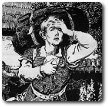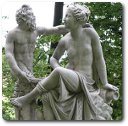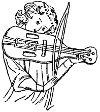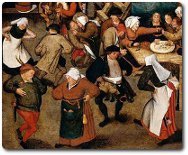Tess of the d'Urbervilles Contents
- Social / political context
- Religious / philosophical context
- Chapters 1-9
- Chapters 10-19
- Chapters 20-29
- Chapters 30-39
- Chapters 40-49
- Chapters 50-59
- Tess as a 'Pure Woman'
- Tess as a secular pilgrim
- Tess as a victim
- The world of women
- Tess as an outsider
- Coincidence, destiny and fate
- Disempowerment of the working class
- Heredity and inheritance
- Laws of nature vs. laws of society
- Modernity
- Nature as sympathetic or indifferent
- Patterns of the past
- Sexual predation
- Inner conflicts: body against soul
Chapter 10
Synopsis of chapter 10
The local villagers go to market every Saturday at Chaseborough. Tess reluctantly joins them on a number of occasions. She finds she needs to wait and return with them, as her looks attract undesired attention and she feels unsafe alone.
One Saturday when the fair is in town, the villagers drink and dance long into the evening at a private party. Alec is in town and offers Tess a ride home, which she refuses, despite the lateness of the hour.
When the villagers finally start the journey home, they are all fairly drunk. One of the women, Car Darch, a former favourite of Alec's, finds a jar of treacle she has bought has broken and is running down her back. Car's attempts to clean up the mess provoke her companions' laughter, including Tess's. Car jealously turns on Tess and offers to fight her.
In the ensuing mêlée, Alec rides up and offers to extract Tess from it. This time, she impulsively jumps up behind him and they gallop off. The village women roar with laughter as they have an idea what will happen. The villagers resume their journey home.
Commentary on chapter 10
the choice spirit: in pagan beliefs, each place had its own spirit, which affected the people living there. Hardy has secularised the idea, hinting that it is now Alec who is the presiding spirit. His behaviour is typical or symptomatic of the moral carelessness of the villagers.
parish relief: the Poor Laws left it to each local parish to help out those who could not work, especially those too old to work. Whereas many people did their best to avoid the shame of receiving relief, these villagers welcome it. Dickens' novels show the extent to which many people went to avoid being on relief, for instance Betty Higden in Our Mutual Friend.
monopolisers of the once independent inns: another shift of economic power away from the local people to distant manufacturing and trading. These inns once brewed their own beer, but now have been taken over by the larger breweries who clearly dump on them liquor of inferior standard.
 pilgrimages, pilgrims: a pilgrimage is a religious journey to a holy place, sometimes undertaken in a group, as in Chaucer's Canterbury Tales (see Pilgrimage in literature). Hardy uses the term ironically in a secular sense, the villagers being anything but holy.
pilgrimages, pilgrims: a pilgrimage is a religious journey to a holy place, sometimes undertaken in a group, as in Chaucer's Canterbury Tales (see Pilgrimage in literature). Hardy uses the term ironically in a secular sense, the villagers being anything but holy.
More on pilgrimage in Hardy: Critics have noted that many of Hardy's characters are secular pilgrims: they are on a journey to a desired place, but there is a loss of any spiritual meaning to the journey. For example, in Jude the Obscure, Jude directs his steps to Oxford, but never finds any meaning there. For other references in Tess, see Chs. 16, 22, 44, 52.
marriage before means: the Victorian ideal of thrift taught that young people should not marry before they could afford it. These villagers take no notice of this, as there is no incentive to get on, wages remaining the same however many years have been worked.
momentary threshold of womanhood: see Ch 7 for comments on margins. It is 'momentary' because it only takes a brief time to cross a border, however profound the implications.
 satyrs clasping nymphs: Hardy uses references to classical pastoral for the villagers dancing. Satyrs were half human, half animal males, often with exaggerated sexual appetite and associated with Dionysius or Bacchus, the god of wine; nymphs were female beings of the woods and fields.
satyrs clasping nymphs: Hardy uses references to classical pastoral for the villagers dancing. Satyrs were half human, half animal males, often with exaggerated sexual appetite and associated with Dionysius or Bacchus, the god of wine; nymphs were female beings of the woods and fields.
Pans, Syrinxes: In classical mythology, the nymph Syrinx was pursued by the fertility god, Pan, but was turned into a reed by other gods before Pan could catch her. The sexual nature of the myth anticipates Alec's pursuit of Tess, but without the transformation.
Lotis, Priapus: a similar myth. Priapus was the god of sexuality and lust.
Sileni: another mythological reference. Silenus was the companion of Bacchus.
Flower-de-Luce: name of an inn derived from the fleur-de-lys, or lily flower, which was the national emblem of France.
 on the wrong side of the bridge: the bridge of the fiddle or country violin is the structure holding the strings up. The wrong side is that nearer the player. Hardy as a youth was a fiddler in a country band and would have been very familiar with these gigs.
on the wrong side of the bridge: the bridge of the fiddle or country violin is the structure holding the strings up. The wrong side is that nearer the player. Hardy as a youth was a fiddler in a country band and would have been very familiar with these gigs.
red coal of a cigar: Alec's cigar becomes a synecdoche of the whole man. It is usually seen as a phallic symbol.
harmoniously and joyously interpenetrated each other: probably an ironic allusion to Wordsworth's famous poem Tintern Abbey, where he talks of:
Of something far more deeply interfused'.
Hardy seems to be suggesting the ecstatic and passionate state the villagers have attained is through alcohol, not through any mystical experience of nature. Hardy's use of 'sublime' is another ironic reference to such a mystical experience.
Praxitelean creation: Praxiteles was a Greek sculptor who is credited with carving the first female nude.
whorage: the local meaning of the term just means a collection of rowdy women rather than a group of prostitutes.
Time
Several months have passed since Tess first started working at 'The Slopes', and it is now September, when the nights start drawing in. It is a Saturday. Most farm workers had to work much of Saturday, so the villagers would only have got to the town late afternoon or early evening.
Place
 The dance is held away from the town in a barn. Hardy explains the villagers feel freer there since the women don't mind being seen with their boyfriends. Barn dances were very common at the time. Hardy's detailed description again suggests a genre painting.
The dance is held away from the town in a barn. Hardy explains the villagers feel freer there since the women don't mind being seen with their boyfriends. Barn dances were very common at the time. Hardy's detailed description again suggests a genre painting.
More significantly, this is Tess's third journey, and, in terms of danger and repercussions, climaxes the group of three in this first section of the novel.
Trantridge, Chaseborough: see Ch 5.
Vocabulary
animus: forceful hostility, or actuating spirit
draperies: material for clothing or curtaining
fancy-man: boyfriend
fatuous: foolish
idiosyncrasy: behaviour specific to the group or individual
laconically: with a minimum of words
trap: a smart passenger carriage, though Hardy obviously uses the term because of its other meaning
virago: a loud, overbearing woman
vituperation: insults and angry words
Investigating chapter 10
- Compare the description of the villagers at the beginning of the chapter with that at the end.
- Do you see any significant difference in Hardy's attitude towards them in the two descriptions?
- Can you account for any such difference?
- The poet Wordsworth had a great admiration for country people as being close to nature, a closeness which gave them a certain sublimity.
- How does Hardy depict them in terms of their sublimity?
- Why do you think Hardy uses so many classical mythological references in his descriptions of the barn dance and walk home?
- N.B. Make sure you understand who Pan and Dionysius are
- Compare the barn dance here with the club walking dance in ch 2.
- What significant differences do you see?
- Examine Tess's isolation
- What causes it?
- Is there any significance in the nicknames given to the two Darch girls?
- What causes Tess to accept Alec's help at the third offer?